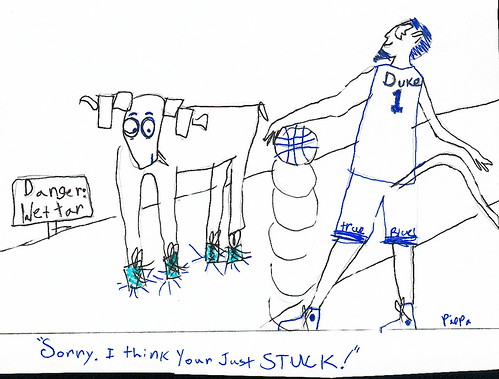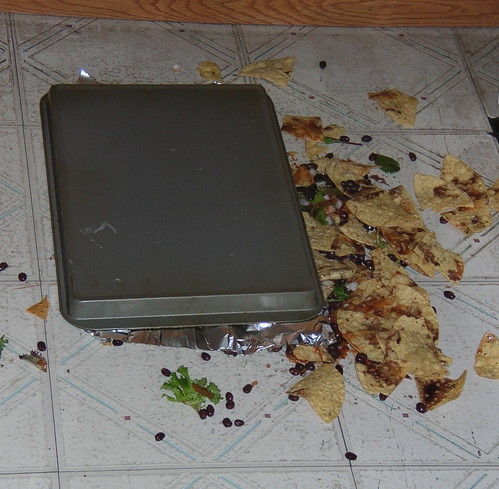Duke squeaked out a close win tonight over their arch-rival, the Carolina Tar Heels. Duke led through most of the game, but Carolina came back in the second half to pull ahead for a frightening window, leading by five points with four and a half minutes left. In the closing moments Duke pulled ahead to stay; even the home court couldn’t cheer Carolina to victory when the teams were traded the lead over and over, down the stretch. Must have been a great game to watch — keeping a vigilant eye on the internet scoreboard just doesn’t measure up.
I mention Duke’s win not [only] to craw about my alma mater, but to raise a question with historiographic overtones. There’s a persistent legend that Duke gets all the breaks when refs make close calls. Coaches and (especially) TV analysts repeat that assertion that Duke gets the benefit of an undue proportion of referees’ decisions.
Now, I’ve known a couple of referees in my day (not ACC refs, but I take it that the attidue must be roughly the same, and the professionalism even higher) (not a knock on you, Rev). The idea that one of my ref friends would bend a rule or favor a team at all, at any level, for any reason, rings a false note to me. The notion that an ACC ref would play favorites seems inconceivable (remember, the league officials review these games to evaluate the refs’ work; would you risk your standing as a ref in an elite basketball conference in order to favor a particular team?). I’d allow the chance that each ref might have a small bias relative to one or another team, but the idea that all favor Duke seems patently absurd.
Plenty of games draw on pools of refs from outside the ACC, too; do we suppose that these out-of-conference refs favor Duke, too? And all these refs continue to favor Duke game after game, even when they know there’s a hue and cry about refs favoring Duke? I’m sorry, you’d have to be willfully ignorant to believe such a thing.
Maybe Mike Kryzsewksi casts a hynoptic spell on refs, whom he intimidates with his glare? Presumably a scowl from Coach K does a better job than the invective from every other coach in the country. I don’t think so.
Maybe the Big fix is in, and TV executives (the ones who employ the analysts who decry Duke’s prevalence) have decreed that Duke should win. They must have decided that Duke would usually win, since Georgetown upset them impressively this winter. There may be an executive in charge of deciding which games Duke would win or lose. . . .
The closer you look, the less probable such an elaborate scheme becomes. We’d need a whole troupe of conspirators who keep secrets better than does the NSA. Not one of the players, coaches, refs, conference administrators, NCAA officials, media execs, or anyone else who would have to play a part has leaked the inside secret. But don’t take my word for the implausibility of this premise — Al Featherston runs some numbers to cement the premise that Duke doesn’t show a statistical prevalence in getting the benefit of foul calls.
Of course, this topic provokes the question, “Who says that all teams ought to be called for the same number of fouls anyway?” I’ve certainly seen teams who hacked and shoved a lot; such a team would, presumably, be called for more fouls than the team that doesn’t hack and shove. And while it’s easy to find clips of Duke players not getting called for what look like fouls, it’s easy to find that footage of any team (except, perhaps, a team that’s so bad that all its fouls are obvious fouls). saying, “They missed this one” doesn’t prove anything unless you can show a pattern of not calling this, this this and this alleged foul by Duke, but calling that, that, that, and that against the opposing team. Without analysis, claims about Duke getting the breaks amount to nothing more than justifying intuitions with isolated anecdotes.
What does all this have to do with historiography? It reminds me of the history-by-fantasy that characterizes conspiracy theorists who write about church history.

